June 16, 2025 | 16:35 GMT +7
June 16, 2025 | 16:35 GMT +7
Hotline: 0913.378.918
June 16, 2025 | 16:35 GMT +7
Hotline: 0913.378.918
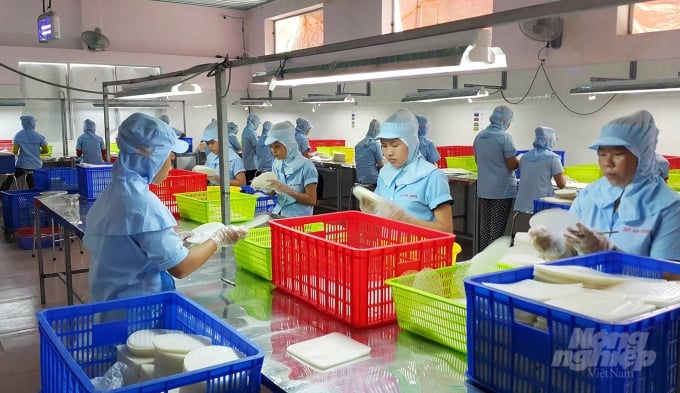
Duy Anh Foods actively collects input materials (rice) over 6 months. Photo: TL.
Duy Anh Food Import-Export Co., Ltd - Duy Anh Foods (Cu Chi district) is one of the businesses developing products made from rice - a famous traditional ingredient of Vietnam, including dragon fruit ricepaper, watermelon vermicelli, sweet potato vermicelli, pho noodle, fine rice vermicelli… and exported to 55 countries and territories, including many fastidious markets. The consumption rate in the domestic market of Duy Anh Foods is about 30%, while 70% is for export, exporting 2 containers per day on average.
According to Mr Le Duy Toan, Director of Duy Anh Foods, the business currently has 4 clients in Russia, 1 client in Ukraine, about 5 containers are exported to these two markets each month on average. “When the Russia-Ukraine conflict broke out, international transport shipments were still operating, but after a week, no shipments were reported going to Russia. Meanwhile, our products have already been prepared in containers and ready to be shipped out, so they must be stopped and stored”, Mr Toan noted.
The question now for the business is what to do with the stored products and when will the new goods be shipped. To cope with the situation, Mr Toan said that the business had to reassign a number of products (unfinished products - PV) that could not be exported to Russia and Ukraine into suitable packaging for export to other countries such as Poland, Czechoslovakia…
Mr. Toan acknowledged that due to Russia and Ukraine markets only accounting for about 10% of Duy Anh Foods' output, the business encountered an insignificant impact. According to Mr Toan, while the business was beginning to enter a stage of compensating for the time off from the Covid-19 pandemic due to the lack of "three on-the-spot", it was met with the increase in gasoline prices, the increase in materials input cost, the increase in freight rates, plus the impact of the Russia-Ukraine conflict, causing many difficulties for the business. "The contracts have been signed with foreign clients in advance, so they still have to keep a stable price without increases from 6 months to 1 year ", Mr. Toan said.
To overcome the problem, Mr Toan said that in the immediate future, the business has taken the initiative in input materials, signing contracts of rice orders for 6 months to stable prices. In addition, modifying machines to operate faster for a quick production, reducing labor costs.
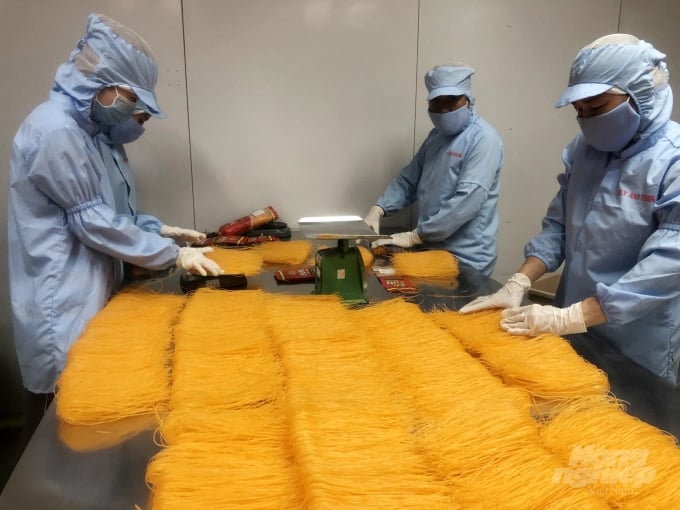
Vietnamese businesses had to change to adapt to the situation. Photo: TL.
Mr Doan Minh Quoc, Director of Dinh Quoc Glass Company said that under the direct impact of Covid-19 and the impact of the Russia-Ukraine conflict, the price of raw materials that the business must import from the US increased. The business was unable to request containers, while containers and transportation prices increased. Suppliers required payment, ship orders, raw materials orders,... in advance, which affects the cash flow of the business.
According to Mr Quoc, in order to overcome this difficult period, businesses have to improve their own competitiveness, reduce personnel and factory costs, reduce unnecessary costs... to optimize production and make the "scale" of businesses more compact; prepare a proactive attitude toward cash flow, diversify product channels appropriately. Mr. Quoc noted that although the conflict did not affect Vietnam directly, it still had an indirect impact, businesses had to respond to fit the times.
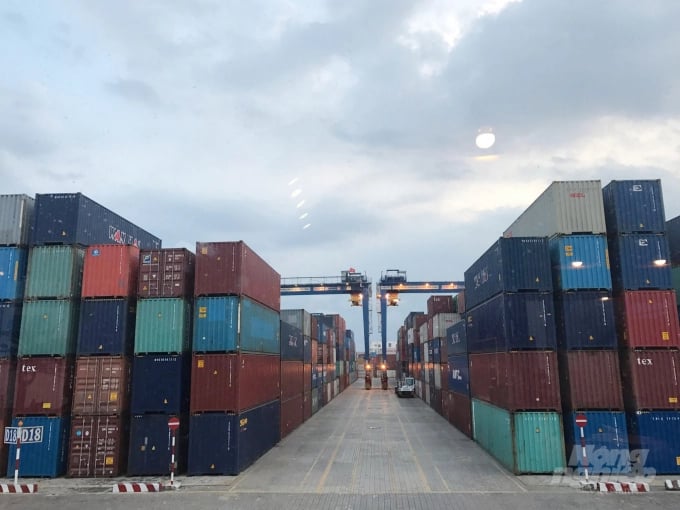
This is a great opportunity for Vietnam to export to the EU market. Photo: Nguyen Thuy.
At the seminar "Vietnam’s businesses under the impact of the Russia-Ukraine war" held by Business Association of high quality Vietnamese goods, Tran Quoc Hung Ph.D., Executive Director of the Institute of International Finance (IIF) said that the Russia-Ukraine conflict has caused great disturbances in the world financial, oil, and grain markets; increase inflation, reduce economic growth worldwide. Vietnam is also affected by these influences, but can also find opportunities for development.
Russia and Ukraine are the two countries that provide more than 30% to the world wheat market. The war and sanctions caused wheat prices to go up 50% in the past month, increasing the prices of other grains and agro-products. If the conflict persists, the supply of wheat to the world market could drop by 30%, creating a food crisis, causing further increases in agro-products prices and famine in some regions.
“Meanwhile, Vietnam exports over 6.5 million tons of rice/year, ranking second in the world after India (18.7 million tons/year). Consequently, the increase in prices of rice and agro-products is beneficial for Vietnam, mainly for businesses exporting rice and agro-products; but also raise food prices for consumers.” Hung Ph.D. acknowledged.
According to Hung Ph.D., the current situation is also a great opportunity for Vietnam to increase the export of rice and other agro-products to the EU market during increasing demand, which imports about $160 billion of food each year.
Hung Ph.D. noted that in the long term, Vietnam’s businesses need to change and be determined to change, especially in terms of standards and technology, to be able to penetrate into fastidious markets with high standards like the EU and the US.
“Vietnam should focus on improving its market share in the EU market, using up the rice export quota of 80,000 tons/year with the tariff rate of 0% under the EU-VN Free Trade Agreement (EVFTA) in the immediate future. In 2021, Vietnam only exported 60,000 tons/year. In particular, it is advisable to develop high-quality, high-value aromatic rice that is being favored by European consumers.
It is important that the government, business associations and businesses themselves know about the US embargo law and conduct discussions with the US to avoid sanctions for allegedly violating the embargo measures placed against Russia" Tran Quoc Hung Ph.D. advised.
On the same point of view, Assoc. Prof. Ph.D. Nguyen Duc Thanh, Director of Center for Economic and Strategic Studies (VESS), supposed that fertilizer and animal feed prices will increase, making import more difficult. Problems will appear on the food export market, causing substitution effects, pushing up the price level, while the export volume remains unchanged. In general, Vietnam will have certain benefits in price, this is a detail that businesses should consider when negotiating contracts to avoid disadvantages.
In addition, businesses have been and will be under pressure from rising raw material and fuel prices, without much fiscal space to support businesses. Mr Thanh contended that the Government can partially support the people and businesses facing difficulties with tax reduction measures, using the stabilization fund to prevent fuel prices from skyrocketing. On the other hand, it is time for both businesses and people to get used to crises and frequent fluctuations in a full market economy.
Translated by Hoang Duy

(VAN) Noting risks, report examines impacts of avian influenza, changing trade patterns since 2022, fish fraud, and shipping industry’s net-zero goals.

(VAN) Mr. Tran Quang Bao, General Director of the Forestry and Forest Protection Department, met and worked with the International Wood Products Association to promote cooperation in the field of timber trade.

(VAN) China's outbound shipments of rare earths in May jumped 23% on the month to their highest in a year, though Beijing's export curbs on some of the critical minerals halted some overseas sales.

(VAN) To sustain capital flow, administrative reform alone is not enough; what farmers truly need is an ecosystem where both government and businesses grow together in support.
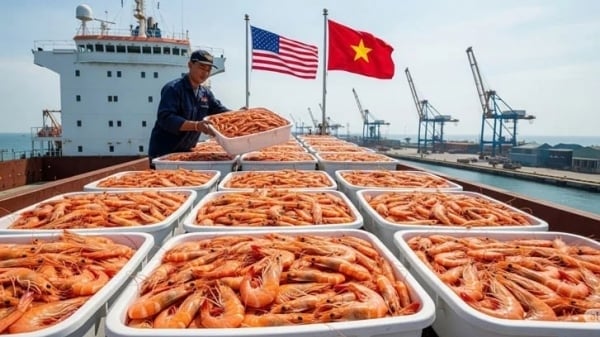
(VAN) Vietnam and the United States are proactively working together, each in their own way, to ensure that every container of agricultural goods carries not just products, but also long-term trust and value.
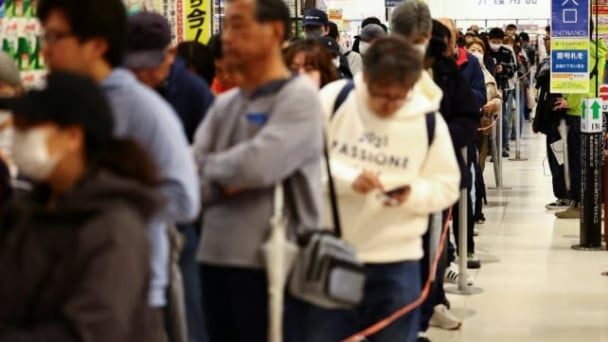
(VAN) Stores have started selling rice from the government’s stockpile to feed demand for the staple.
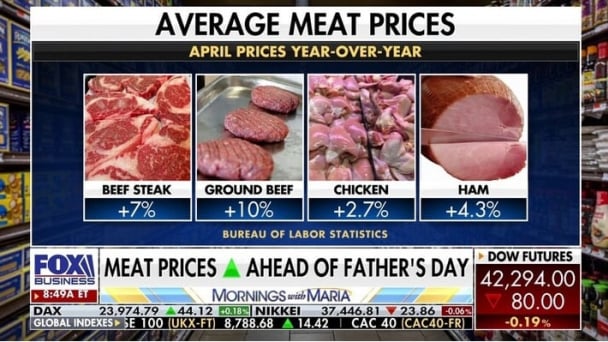
(VAN) Omaha Steaks CEO says rebuilding cattle herds will take about a year to ease price pressures.